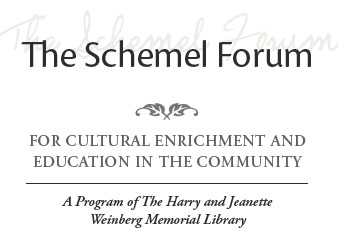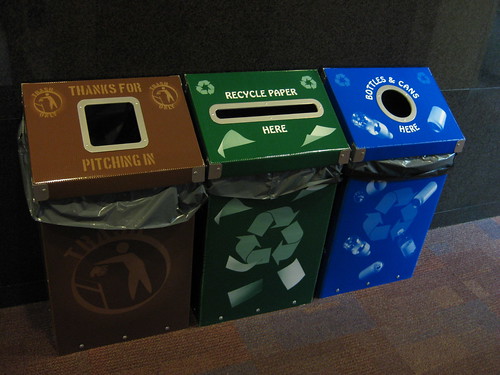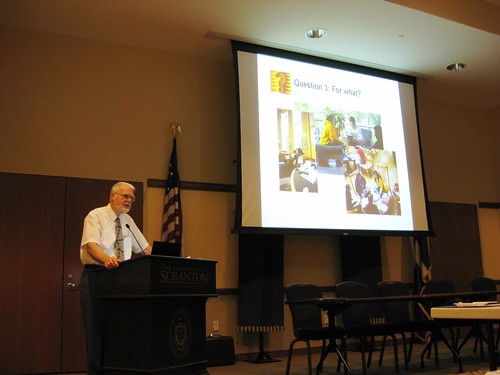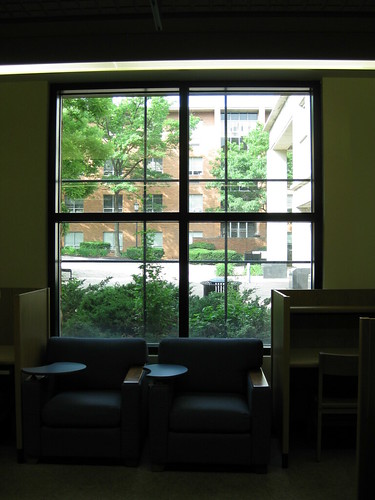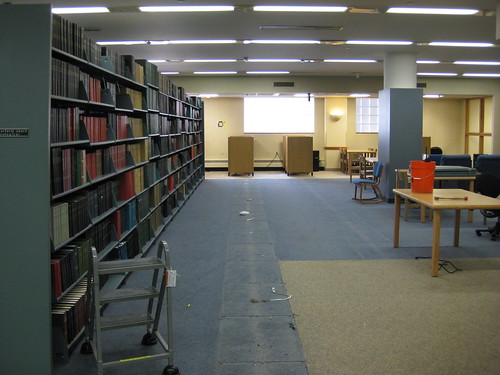The Weinberg Memorial Library has had a customized Google Places listing for over a year now. But we just recently got our own Places QR code! If you have a smartphone with a QR code reader app installed, take a picture of our code above to go directly to our Google Places page on Google Maps.
Author: Kristen A. Yarmey
Shiny and New for Fall 2010
 Our new study space is… almost done.
Our new study space is… almost done.
If you’ve been off campus since May, you might notice that there have been quite a few changes happening at the Weinberg Memorial Library. Our Library faculty and staff were working hard over the summer to bring you a laundry list of new services and improved facilities. Take a look!
- New Library website – librarian Donna Mazziotti led a team in redesigning our Library home page to match the rest of the University’s web presence. We’ll be unveiling the new site on Monday, August 23rd in time for the start of classes. This is a big transition for us, so please be patient as we make the switch, and let us know if you find any broken links!
- New 24-Hour Study Space – our Physical Plant staff renovated our 1st floor periodical room to create a new 24-hour study space for students. You’ll be able to swipe in using your Royal Card, even after the rest of the Library has closed. And just like the Pro Deo room, we’ll have a small set of computers for students to use – along with a brand new, high capacity printer. The room will be open as of Monday!
- Rock Band and Wii – our game nights were so popular last Spring that we decided to buy our own gaming equipment. The Library staff has already tested it out, so it’s ready to go for our first game night of Fall 2010 – August 26 at 10pm!
- Digital Signs – We always have a lot of news to share about Library events and services. Now you’ll be able to catch up while waiting in line at Java City or the circulation desk, just by glancing at our shiny new digital signage.
- Text Messaging Reference – Okay, so technically we started offering text messaging reference last spring. But we’re so excited about it that we’ll be promoting it like crazy this semester. Text us at 570-687-8787 to get help from a librarian, anytime the Library’s open.
- Recycling Bins – our new Library green team is off and running, and our first major initiative is to reduce the amount of trash the Library puts out. Make sure you keep an eye out for our new recycling bins and sort your bottles, cans, and paper recycling appropriately.
- New Staff – Last but certainly not least, we’re proud to welcome Sheli McHugh as our new cataloging librarian! You might also notice that former cataloging clerk Sharon Finnerty has moved upstairs to serve as our new Media Resources Coordinator. We’ll be posting introductions to Sheli and Sharon here on Infospot in the next week.
As usual, your feedback is important to us – so let us know what you think about everything that’s new!
Technology on Your Own Terms Fall 2010
Each semester, the Weinberg Memorial Library and the Center for Teaching & Learning Excellence (CTLE) offer a faculty and staff advancement series called Technology on Your Own Terms. The series introduces University faculty and staff to emerging technologies in a hands-on environment, in order to encourage innovation in the workplace and in the classroom. We’re continuing the series in Fall 2010 with a theme of “Get to Know Google,” featuring workshops on four different Google services. All workshops take place in Rm. 306 of the Library.
Just Google It!
Tuesday, September 14 from 12pm – 1pmOne billion results in 0.27 seconds! When you need information, chances are you use Google™ to find it. In this workshop, you will learn how Google’s Web search engine works. You will also learn some tips to help you improve your search experience as well as some of Google’s special features, such as Google Books and Google Scholar. (Taught by Bonnie Oldham, Weinberg Memorial Library)
Google Docs: An Excellent Way to Create, Collaborate on, and Securely Store Documents
Friday, October 1 from 12pm – 1pmThis workshop will introduce you to Google Docs, a service that allows you to create documents that parallel Microsoft Office: Word, Excel, and Powerpoint. It also allows for the creation of online surveys and the storage of any type of document in a very secure environment. Google Docs offers excellent collaborative opportunities for working on any supported document type with both peers and students, meaning that the tool can be used for course paper submissions, faculty feedback, collaborative student projects, club, or research purposes. (Taught by Dr. Tim Cannon, Psychology/Neuroscience)
Get Where You’re Going with Google Maps
Tuesday, October 12 from 12pm – 1pmMany people know that you can use Google Maps to get driving directions from one place to another. But did you know that you can also use Maps to scope out a vacation destination, find the closest Italian restaurant, or make a custom map for a friend or a project? In this workshop, you’ll explore specialized features and tools available in Google Maps to help you get where you want to go. (Taught by Kristen Yarmey, Weinberg Memorial Library)
Does Google Give You A Voice?
Thursday, November 4 from 12pm – 1pmIn this workshop, we will explore Google Voice, a recently-made-public service of the search giant. Google Voice offers one central phone number, which can be setup to call your other phones based on caller, time of day, etc. Other features of the service include visual voicemail, personalized greetings, voicemail transcription, international calling, and a lot more. It is easy to set up… Learn how! (Taught by Eugeniu Grigorescu, CTLE)
All faculty and staff members are welcome, but seats are limited, so please register for sessions you plan to attend at www.scranton.edu/ctleregistration (select Special Event).
Schemel Forum Fall 2010 Schedule
The Fall 2010 Schemel Forum schedule is here!
As usual, the Weinberg Memorial Library and the Schemel Forum have prepared a fantastic calendar of evening courses, luncheons, and concerts for your intellectual enjoyment. Like Dr. Denise Fulbrook’s six-session evening course on “The Absolutely Fabulous, Suspiciously Witty Work and Legacy of Jane Austen,” or National Museum of American History director Brent Glass‘s luncheon titled “America Engaged in the World: Cultural Diplomacy Still Works!”
We’re especially looking forward to this year’s University for a Day on October 2, when authors Christopher Hitchens and Jay Parini will discuss “Books and Argumentation” with moderator Attorney Morey M. Myers.
If you’d like to join us for an event, just contact Kym Balthazar Fetsko, our Schemel Forum Events Coordinator, at 570-941-7816 or fetskok2@scranton.edu.
The Scholarly Side of Mad Men
If you’re a fan of the AMC television series Mad Men, you’re probably anxiously awaiting the season premiere, coming up this Sunday. Mad Men isn’t just a television show, though – it’s also a great excuse to do a little independent historical research and gain a deeper, more scholarly understanding of America in the 1960s.
One of the reasons the show is so compelling is that the writers and producers pay very close attention to historical detail, and they often incorporate references to real-life events into the fictional characters’ lives. For example, you might remember the Drapers’ maid Carla listening to a radio broadcast of Martin Luther King, Jr.’s eulogy for four young girls killed in the 1963 Birmingham bombing, or Pete Campbell’s father dying in the American Airlines Flight 1 crash of 1962. So over the next few days, why not indulge your Mad Men madness by immersing yourself in the 1960s? The Weinberg Memorial Library can help!
- If you want more information about a historical reference made on the show, you might want to use our e-book version of The Historical Dictionary of the 1960s (edited by James S. Olson) to fill in the holes. And you can also use our Credo Reference tool to search for encyclopedia or dictionary entries about any historical event.
- To get a feel for 1960s print advertising, try browsing through the Historical New York Times – the Library’s subscription means that University community members can access this database for free. You can also find digitized 1960s issues of Life Magazine online, courtesy of Google Books.
- For insight into Betty Draper’s life as a desperate housewife, you’ll definitely want to read Betty Friedan’s The Feminine Mystique. If you’re more interested in the working girl characters of Peggy Olson or Joan Holloway, request Helen Gurley Brown’s Sex and the Single Girl via PALCI E-Z Borrow for a glimpse at 1960s-style dating.
- Richard Yates’ novel Revolutionary Road is a famous portrayal of marriage in the 1950s, which might help you understand why the characters struggle to deal with the changing expectations of the 1960s.
- Season 4 will take place starting in November of 1964 – the month that Lyndon B. Johnson defeated Barry Goldwater in the presidential election. The Weinberg Memorial Library has several books about Johnson’s presidency that you can browse – and you might find Theodore White’s The Making of the President, 1964 worth a read.
- The Library also has copies of several books that Mad Men characters have mentioned (or have been seen reading) over the past three seasons – like Frank O’Hara’s Meditations in an Emergency, Leon Uris’s Exodus, David Ogilvy’s Confessions of an Advertising Man, Ayn Rand’s Atlas Shrugged, and Mary McCarthy’s The Group.
- If you need to catch up on Seasons 1, 2, or 3, you can borrow the DVDs from our colleagues over at the Albright Memorial Library.
If you’re looking to do more in-depth research on the 1960s, you’ll definitely want to visit our collection of history-related scholarly databases. And don’t forget, if you need help, you can always ask a librarian. Happy viewing!
Recycling in Style
You might have seen in one of our earlier posts that the Weinberg Memorial Library recently started a Green Team. We’ve wasted no time getting started on making the Library a more sustainable place to study and work.
This month, the Library purchased new WedgeCycle recycling bins to encourage our patrons to separate their recyclable paper, bottles, and cans from other non-recyclable waste. We’re hoping that the bright colors (blue for bottles & cans, green for office paper, brown for trash) and clear labeling will remind everyone to think before they toss.
You’ll find our new recycling bins on each floor of the Library. We’ve put them in what we think are the most convenient locations for students – so if you see someone about to throw away a plastic bottle or a stack of office paper, please remind them to look for the recycling station instead of the trash can!
A Greener Weinberg Library, Coming this Fall
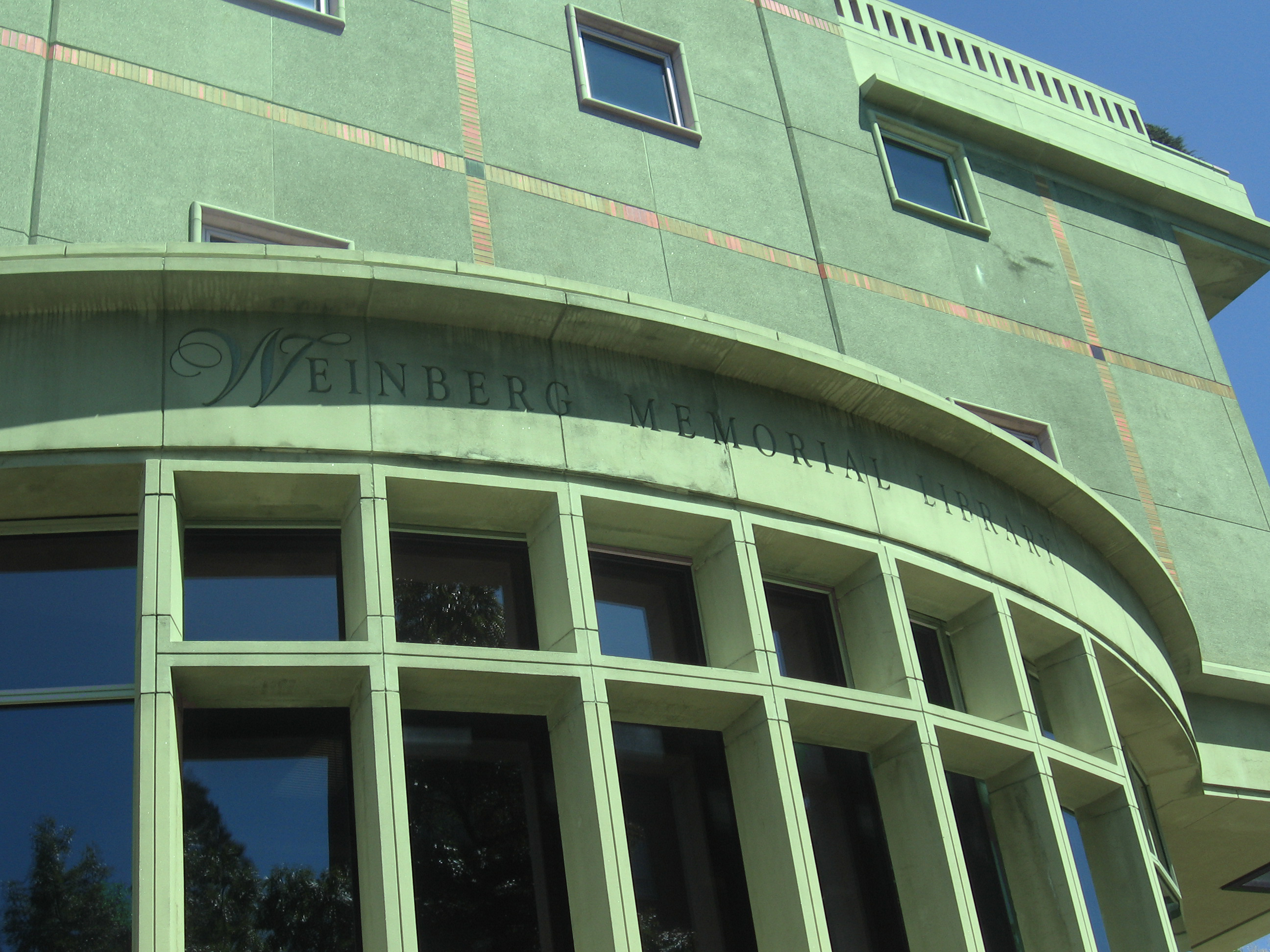
Earlier this week, a group of Weinberg Memorial Library staff and faculty members took a break from our regular Library work to brainstorm about what we could do to make our Library more sustainable. We came up with a lot of great ideas, from water bottle refill stations to cutting down on paper memos. And there are even a few things that we’ve already started doing – our Physical Plant staff uses green cleaning products to keep the Library neat and shiny, and we’ve begun a switch to more energy efficient lighting.
At the end of the meeting, we formed the first ever Weinberg Memorial Library Green Team. Sixteen members of the Library staff and faculty volunteered to participate, and those members represent nine of the Library’s different departments: Administration, Archives, Cataloging, Circulation, Digital Services, Media, Reference, Serials & Acquisitions, and Systems. We also hope to have a representative from Student Government join us.
Throughout the next few months, the new Green Team will be starting to implement our ideas. Check back here at Infospot @WML for the latest news, and please comment if you have any suggestions for us!
P.S. If you’re interested in what’s happening with sustainability on the University of Scranton campus, take a look at the University’s Task Force on Sustainability web site.
Pennsylvania academic librarians gather in Scranton
Yesterday, the University of Scranton campus welcomed the Pennsylvania Library Association‘s College & Research Division for its annual conference. Academic librarians from all over the state (even as far away as Pittsburgh) came to the DeNaples Center to learn from their peers and discuss new ideas.
The theme of this year’s conference was “Information Commons in the Wild: Lessons from the Field.” Dr. Scott Bennett, Yale Librarian Emeritus and a Library Space Planning consultant, served as the keynote speaker and led conference participants in discussing the philosophy and purpose behind the information commons design model.
In the afternoon, a panel of librarians (Don Smith, Katherine Furlong, Sally Kalin, and Anu Vedantham) shared experiences with creating information commons at their respective institutions (the University of Louisiana at Monroe, Lafayette College, Penn State, and the University of Pennsylvania). We’ve posted a few photos of Scott and the panel on our Flickr page.
Many thanks to our speakers and all of the librarians who survived I-81 traffic jams to participate! And special thanks to our own Bonnie Oldham, PALA-CRD’s chair elect, for all of her work coordinating the event.
Construction begins on new study space
Over the past few years, our students here at the University of Scranton have consistently let us know that they’d like to have more study space – and especially more study space that’s available for late-night study sessions.
Back in March, we announced that we’d gotten the go-ahead to renovate our first floor print periodical room to create a new study space that (just like the Pro Deo room) will be open to students 24 hours a day (via card swipe after the Library closes for the night). And finally, after a lot of planning and discussion, we’re beginning construction on the new space! If you’re interested in following along, we’ll be posting updates here on our blog as well as on our Facebook and Twitter pages.
So here’s what the study space in the 1st floor periodical room looks like now:
And here’s the window that will be replaced by the new entrance to the 24-hour room:
We’ve started by removing extra shelving to make more room for study tables:
We’ve also removed all of the paintings, and stored them upstairs in the archives to keep them safe during construction. The group study rooms look kind of empty without them:
If you’ll be visiting the Library over the summer, be aware that due to this construction, the print periodical room will be closed to Library patrons. If you need a print periodical for your research, just request it at the circulation desk and a Library staff member will retrieve it for you. Thanks for your patience while we work on this much-needed improvement to our building!
May and June hours
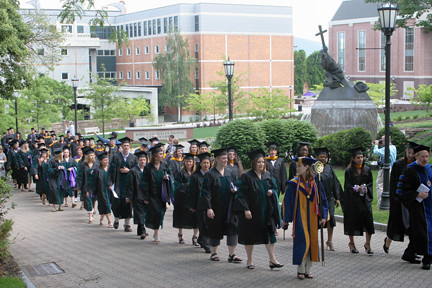 Graduating students process to the 2009 College of Graduate and Continuing Education Commencement ceremony, with the Weinberg Memorial Library in the background
Graduating students process to the 2009 College of Graduate and Continuing Education Commencement ceremony, with the Weinberg Memorial Library in the background
Spring semester has finally come to a close, and here at the Library we’re looking forward to the sunshine, blue skies, and warm breezes of a Northeastern Pennsylvania summer. That doesn’t mean that we’ll be taking it easy, though. The whole Library faculty and staff will be here to serve our patrons all summer long.
In case you need us, here’s our schedule for the next two weeks:
- Monday – Thursday, May 24-27: 8am-4:30pm (Happy Senior Week!)
- Friday, May 28: 8am-8pm
- Saturday, May 29: 10am-4pm (Congratulations masters students!)
- Sunday, May 30: CLOSED (Congratulations to our seniors!)
- Monday, May 31: CLOSED
- Tuesday – Friday, June 1-4: 8am-4:30pm
- Saturday, June 5: CLOSED
- Sunday, June 6: CLOSED
Starting Monday, June 7, we begin our regular summer hours:
- Monday – Thursday: 8am-10pm
- Friday: 8am-4:30pm
- Saturday: 12pm-6pm
- Sunday: 12pm-8pm
And don’t forget that even if you’re off campus for the summer, you can always Ask a Librarian if you have a research or search question.



